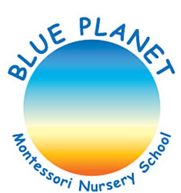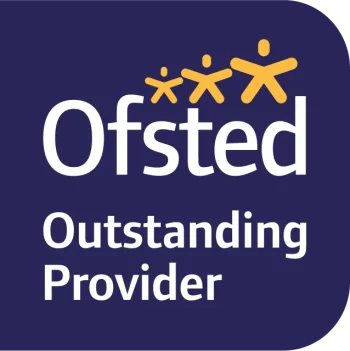Curriculum
The school aims to provide quality education taken into the 21st century encompassing a range of science and technology experiences and cultural studies. These will broaden each child's outlook, creating understanding and enthusiasm for knowledge of the world and developing a social awareness for the environment.
The curriculum is wide ranging and will take into account The Early Years Foundation stage themes and principles. It will include Practical Life skills, Sensorial activities, Knowledge and understanding of the world, Problem solving, Reasoning and Numeracy skills, Communication, Language and Literacy Skills, French, Creative studies, Yoga, Music, Movement and Dance. All of the curriculum is available throughout each session and each child will be able to freely choose activities that meet their interests and developmental needs.
Practical Life
Practical life or exercises in daily living are the first activities a child is introduced to in a Montessori classroom. These activities allow the child to experience everyday skills.
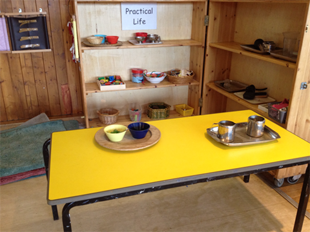
Each exercise is a simple precise task and involves care of ones self, care of the environment and social graces, such as polishing, doing up buttons, pouring water, sweeping, sewing, cutting, folding, threading, carrying apparatus and how to walk and talk in the classroom. As the child performs and completes exercises of practical life she/he develops an awareness of his/her value to the group and so self esteem and self respect develop.
Practical life exercises will also be incorporated in the home corner section and children will also be able to act out daily life experiences such as going to the Doctors, Greengrocers, Bank, Post Office and Library where they can explore and develop their imagination.
These experiences will be supported by visits into the local community.
Although these exercises are skills orientated they develop independence, concentration, motor skills and co-ordination, orderliness, intellectual development, social skills and social awareness.
The child also extends his/her language skills and how to adapt to the environment and be creative in it.
Sensorial Education
The materials in this section of the Montessori classroom are the most attractive and original learning apparatus of its kind. The children learn to discriminate, classify and compare, for example the Pink Tower, one of the first pieces of sensorial material the child is introduced to, develops the child's visual discrimination of differences in three dimensions, fine muscular co-ordination and indirectly prepares the child for the concept of numbers. Other materials include the Cylinder Blocks, Broad Stairs, Smelling Jars, Colour Tablets, Red Rods and Sound Boxes teach the concept of colour, weight, shape, texture, size, sound and smell.
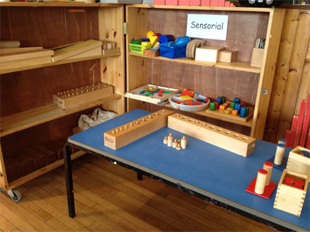
Sensorial apparatus provides the child with sensori-motor activities which have been systematically planned for the five senses and so permit the child to form new concepts through experience and exercise.
The child accomplishes one step at a time gradually moving to more complicated tasks. Where possible each sense is isolated to provide an intense experience. The child is taught the appropriate language for the new experience and skill she/he has acquired and therefore his/her language development is enhanced. Many of the materials provide the child with both direct and indirect experience in the field of mathematics, reading, science and music.
Problem Solving, Reasoning and Numeracy
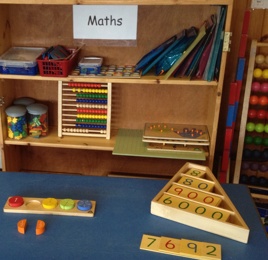
Children are introduced to early maths skills and number operations through a series of number materials and activities. Number songs, rhymes and stories are introduced to reinforce number vocabulary and may help to improve children's interest in early counting. In the same way Sensorial materials are taught gradually, maths follows the same rule. The first materials give the child a concrete impression of quantity and eventually progresses up to exciting and challenging exercises in addition, subtraction, division and multiplication. All activities help children become aware of sequencing, number concepts, recognition of symbols and practice of associating quantity with written symbols.
Communication, Language and Literacy
The Montessori reading programme progresses through three levels. Pink level involves three-letter phonic words that give the child practice in blending sounds, for example, hat, pig, van. Blue consists of longer phonic words containing consonant blends such as drum, frog and cross. Then eventually on to the Green series that introduces phonograms e.g. ship and fish. The child develops spelling skills and learns to recognise letter patterns in words.
Writing skills are developed by the use of Sandpaper letters and the inset for design.
As children listen to poems and stories they share other people's thoughts and feelings, they also learn to sharpen their vocabulary and improve their self expression.
Knowledge and Understanding of the World
Cultural Studies
Cultural studies help each child to develop their personality, adapt to his own culture, respect others and become an independent and useful member of society.
Children are given the opportunity not only to experience and become aware of different cultures but also to gain knowledge about our planet, land forms and geographical features.
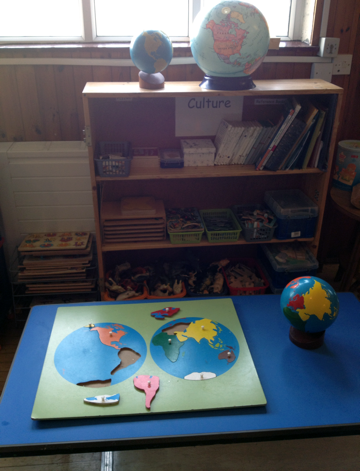
Children can trace and colour each continent using the large map of the world puzzle. Continent and Sandpaper globes give children a concrete and visual perception of what our planet looks like.
Cultural costumes are available for children to dress in. Festivals are acknowledged and celebrated through songs, stories, tasting foods and inviting parents/carers and guests to share their knowledge of their culture.
Science and Technology
This area of the curriculum encourages children to explore the world around us, to question and experiment to see if many ideas and theories work. Children are very curious and in turn, it is necessary to equip children with the knowledge they will need for the future.
Many opportunities and lessons will be made available in this area.
Some of the many topics will include Classification, Magnetism, Space and gravity, melting, sound, Life cycles, mirrors and reflection, yeast and baking.
Nature Studies
Nature studies takes place not only in the outdoors but inside the classroom environment.
Our nature table has a variety of natural objects and materials. There are plants, conkers, shells, stones, twigs etc.. Children are encouraged to contribute natural objects whenever they wish.
There are leaf shaped puzzles, Botany cards illustrating parts of a plant and Zoology cards with various sets of animals to teach children the study of animals and widen their vocabulary.
There will also be an outside flower pot garden area for children to care for.
Creative Studies
The Art and Craft curriculum at Blue Planet is linked with theme work. However painting easels, drawing and colouring and chalkboard are available at all times for children's use. Every month the class focus on a particular theme, e.g. the colour yellow. Artwork would include the making of a sun, duck and daffodils.
These activities are usually done in group format with the guidance of a teacher. These tasks always prove to be a great deal of fun and develop social skills, co-ordination, creativity and encourage self expression.
Yoga, Music, Movement and Dance
These sessions are taught through singing, dancing, story telling, drama and the use of instruments.
These activities improve co-ordination, gross motor skills, self-esteem, confidence and independence.
A child is given opportunities for self-expression and to broaden his/her knowledge of different cultures.
Activities, such as walking on the line, prepare the motor organs for rhythmical exercises. Children move slowly, march or run in rhythm with the music. Their sense of balance and control of movements of their hands and feet are developed.
Physical Education
A wide range of outdoor equipment are available for children to use whilst playing. Outdoor activities such as climbing, running, jumping and skipping are all part of the fun to help improve gross motor skills, co-ordination and social skills. Children will also be given the opportunity to play in the sand and water area. Visits to the park, team games, sports days, yoga enable children to develop an awareness of their bodies and develop a health way of life.
